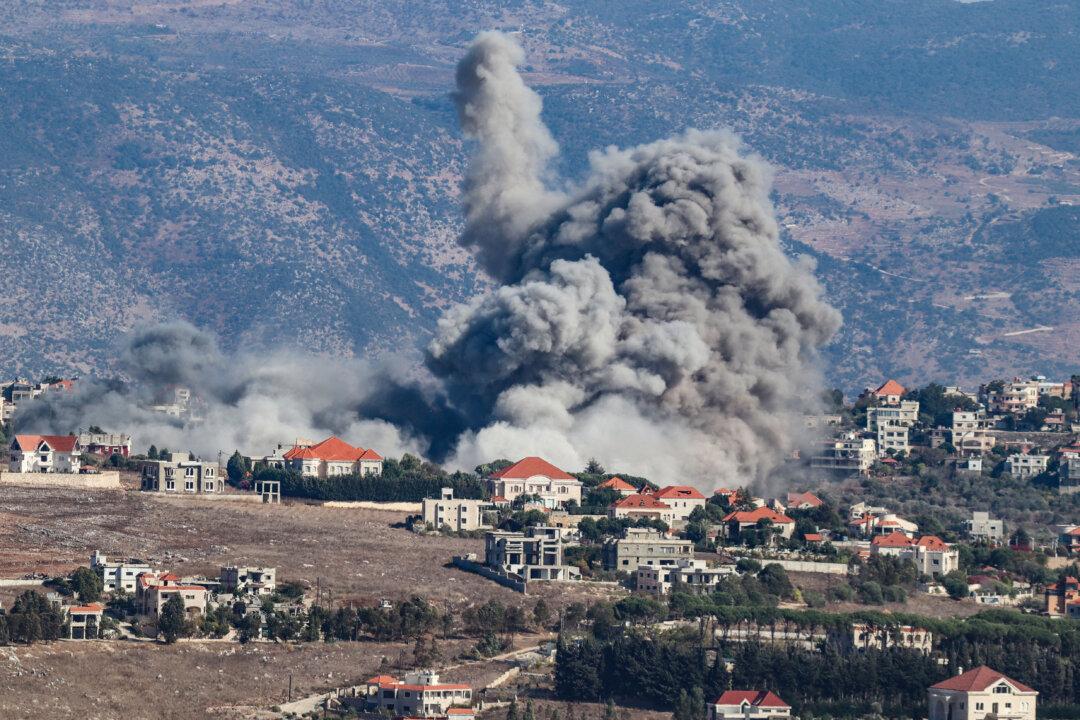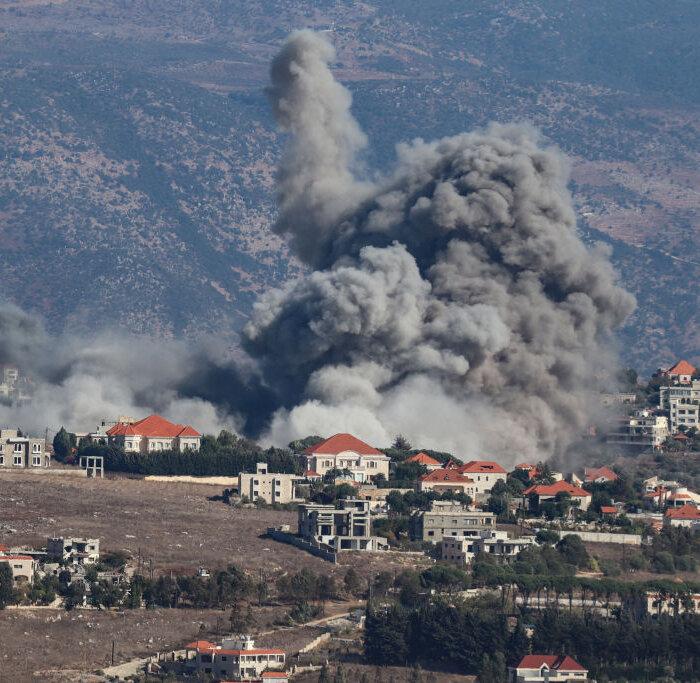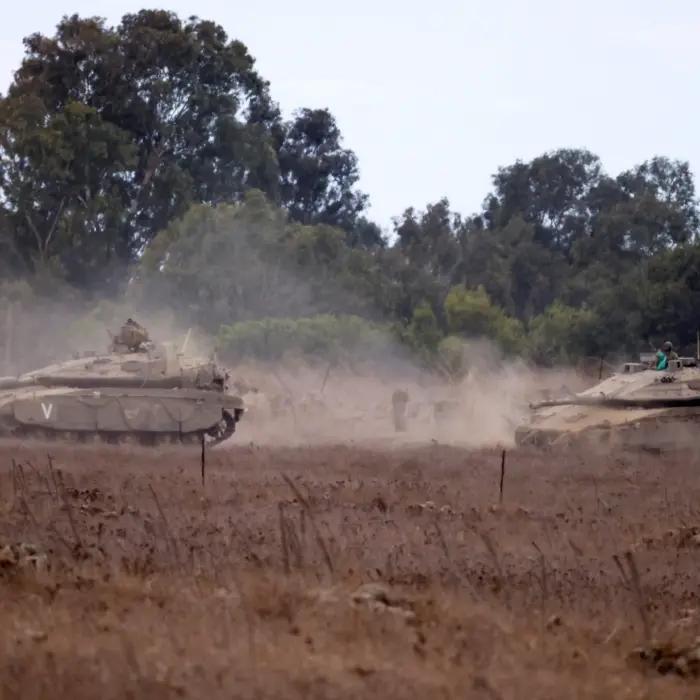Israeli Prime Minister Benjamin Netanyahu appeared to downplay hopes of an imminent truce with Hezbollah on Thursday, after the United States and its allies called for an immediate 21-day cease-fire to “provide space for diplomacy.”
A statement released by Netanyahu’s office as he was en route to the United Nations General Assembly in New York stated that there was only a proposal on the table and that he had not yet responded to it.
The statement also rebuffed the notion that there had been any directive to ease up the fighting on the Israeli-Lebanese border.
Hezbollah has not yet responded to the proposal for a pause in fighting but has previously said it would only stop firing rockets after there was a cease-fire in Gaza.
The statement from the Israeli prime minister’s office said he had “directed the [Israel Defense Forces] to continue fighting with full force, according to the plan that was presented to him.”
The statement also said the fighting in Gaza would also continue “until all the objectives of the war have been achieved.”
Earlier Lebanon’s Prime Minister Najib Mikati said that he hoped a cease-fire could soon be reached between Israel and the Iranian-backed terrorist group Hezbollah.
Mikati welcomed the call for a truce but said the key to implementing it was whether Israel, which has been relocating troops closer to the Lebanese border, is committed to enforcing international resolutions.
Asked if a cease-fire could be secured soon, Mikati said, “Hopefully, yes.”
During a press call on Sept. 26, White House spokesman John Kirby said the United States would continue to push for a pause in fighting along the Israel-Lebanon border to allow for diplomacy.
Kirby said President Joe Biden’s administration wouldn’t have backed the 21-day cease-fire pitch if it didn’t believe Israel would be receptive.
“It was done after a careful consultation, not only with the countries that have signed on to it, but Israel itself,” Kirby said.
The heaviest airstrikes against Hezbollah in Lebanon in nearly two decades have intensified since Monday, with more than 600 people killed in recent days, according to Lebanese authorities.
The statement, released by 11 nations and the EU, states that the goal is to enable civilians on both sides of the border to return to their homes in safety because diplomacy can’t “succeed amid an escalation of this conflict.”
“The situation between Lebanon and Israel since Oct. 8, 2023, is intolerable and presents an unacceptable risk of a broader regional escalation,” the statement reads.
“This is in nobody’s interest, neither of the people of Israel nor of the people of Lebanon,” it added.
Lebanon’s caretaker administration, headed by Mikati, includes ministers chosen by Hezbollah, which is widely seen as the controlling political force in the country.
The cease-fire would apply to the Israel–Lebanon “Blue Line,” the demarcation line between the countries, and would allow the parties to negotiate towards a potential diplomatic resolution of the conflict, according to a senior White House official.
The Blue Line was created by the U.N. as a demarcation boundary in 2000 to verify Israel’s full withdrawal from Lebanon after an 18-year military presence, which began in 1982 in response to Palestinian Liberation Organization (PLO) attacks from Lebanon on Israeli civilians.
U.N. Special Coordinator for Lebanon Jeanine Hennis-Plasschaert said on Thursday that she welcomed the call for an immediate 21-day cease-fire to allow space for diplomacy to succeed.
Israeli airstrikes this week have targeted Hezbollah leaders and hit hundreds of sites deep inside Lebanon. The group has responded with barrages of rockets fired into Israel.
The Israeli Defense Forces said on Thursday that they hit around 75 Hezbollah targets overnight in the Bekaa Valley and southern Lebanon, including weapons storage facilities and ready-to-fire launchers.
One strike reportedly killed at least 23 Syrians when a three-story building in the town of Younine was hit, the town’s mayor, Ali Qusas, told Reuters.
Around 1.5 million Syrians who fled the civil war are residents in Lebanon.
Israel has made a priority of securing its northern border and allowing the return of some 70,000 citizens displaced by near-daily exchanges of fire, which Hezbollah initiated a year ago in solidarity with Hamas, also a U.S.-designated terrorist group, in Gaza.
Israel widened its airstrikes in Lebanon on Wednesday and at least 72 people were killed, according to Lebanese health ministry statements. The ministry also said at least 223 were wounded.
Around half a million have fled their homes in the country, and Lebanese hospitals have been inundated with those who have sustained injuries.
The bombing follows last week’s explosions of pagers and walkie-talkies across Lebanon, killing dozens and wounding thousands more. It is still unclear who’s responsible for the explosions.
Israel’s ambassador to the U.N. Danny Danon told reporters before a Security Council meeting on Wednesday that the Jewish state would welcome a cease-fire and preferred a diplomatic solution.
Danon then told the council that Iran was the main cause of violence in the region, and peace required dismantling the threat from Tehran.
Hezbollah and Hamas are both sponsored by the Islamic Republic.







